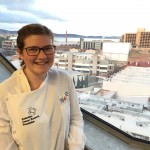
Sionne Lucas
Geneticist, Menzies Institute for Medical Research
Genetics is the study of DNA. You inherit your DNA from your mum and your dad, which is why you might look like your parents or siblings. Your DNA acts like an instruction manual for your cells and contains genes (which are like blueprints) for all the proteins (building blocks) that the cells in your body needs to function. Your DNA has the instructions for what colour hair you have, your eye colour, or whether you are tall or short. However, sometimes there’s a mistake in our DNA and that can mean that a protein isn’t made properly and this can cause disease. In genetics research we study inherited diseases and try and identify these mutations and the genes that are affected. This is important for us to better understand what causes these diseases and can lead to new treatments for patients.
Towards the end of high school, I decided I was going to be a doctor. I had always been incredibly interested in how the body worked, and of course, how things go wrong in disease. So when I went to university I decided to study a Medical Science degree, just to make sure that Medicine was really what I wanted to do. However, during my degree I discovered a strong interest in genetics and ended up doing a placement in a genetics research laboratory. Only a few weeks into my placement I fell in love with research and I never left.
I’m currently working on identifying mutations and genes involved in an eye disease called keratoconus. Keratoconus is a disease of the cornea (the clear layer of your eye in front of the coloured part). The cornea is clear and domed shaped so that light can pass through the eye and focus on just the right spot in your eye for you to see clearly. However, in keratoconus, the cornea thins and changes into a cone shape, and this can severely affect patients’ ability to see. So it is my hope to identify mutations (and the genes involved) that cause keratoconus so that new treatments can be developed to improve the lives of patients.